A Comprehensive Report on IFRS: Benefits, Costs, and Adoption
VerifiedAdded on 2023/04/22
|7
|1167
|300
Report
AI Summary
This report provides a comprehensive overview of International Financial Reporting Standards (IFRS), beginning with its background and evolution as a universal language for business associations. It identifies countries that have adopted IFRS, highlighting Australia, the United States, and various European nations, and explores the benefits of IFRS, such as strengthening financial reporting accountability and improving international comparability and transparency. The report also addresses the costs associated with IFRS adoption, noting the significant compliance expenses and the impact of continuous changes to IFRS standards on companies. It concludes that while IFRS enhances financial reporting quality and reduces information gaps, companies must carefully consider the substantial costs involved in its implementation and maintenance. Desklib offers a wealth of resources, including past papers and solved assignments, to further support students in their understanding of IFRS and related topics.
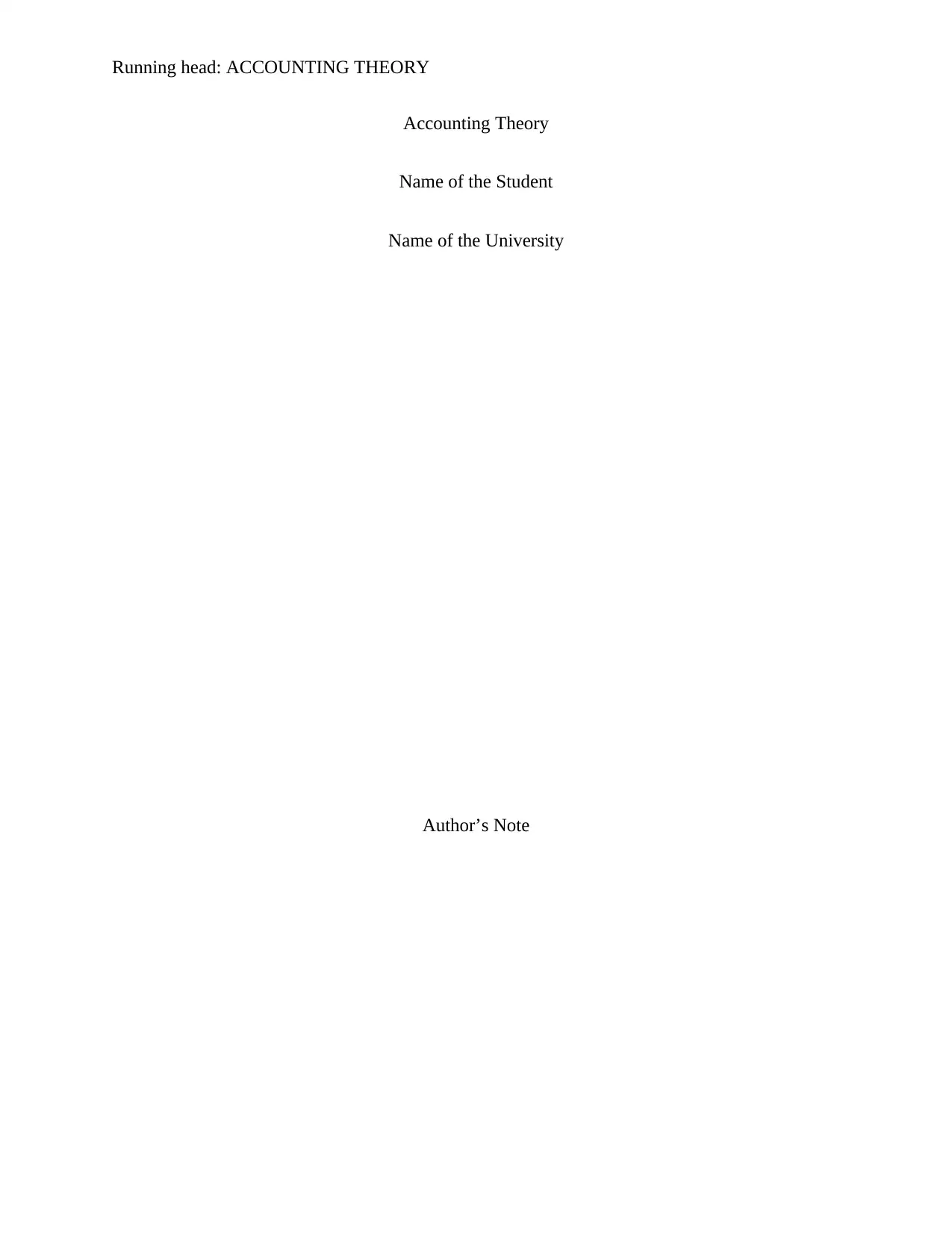
Running head: ACCOUNTING THEORY
Accounting Theory
Name of the Student
Name of the University
Author’s Note
Accounting Theory
Name of the Student
Name of the University
Author’s Note
Paraphrase This Document
Need a fresh take? Get an instant paraphrase of this document with our AI Paraphraser
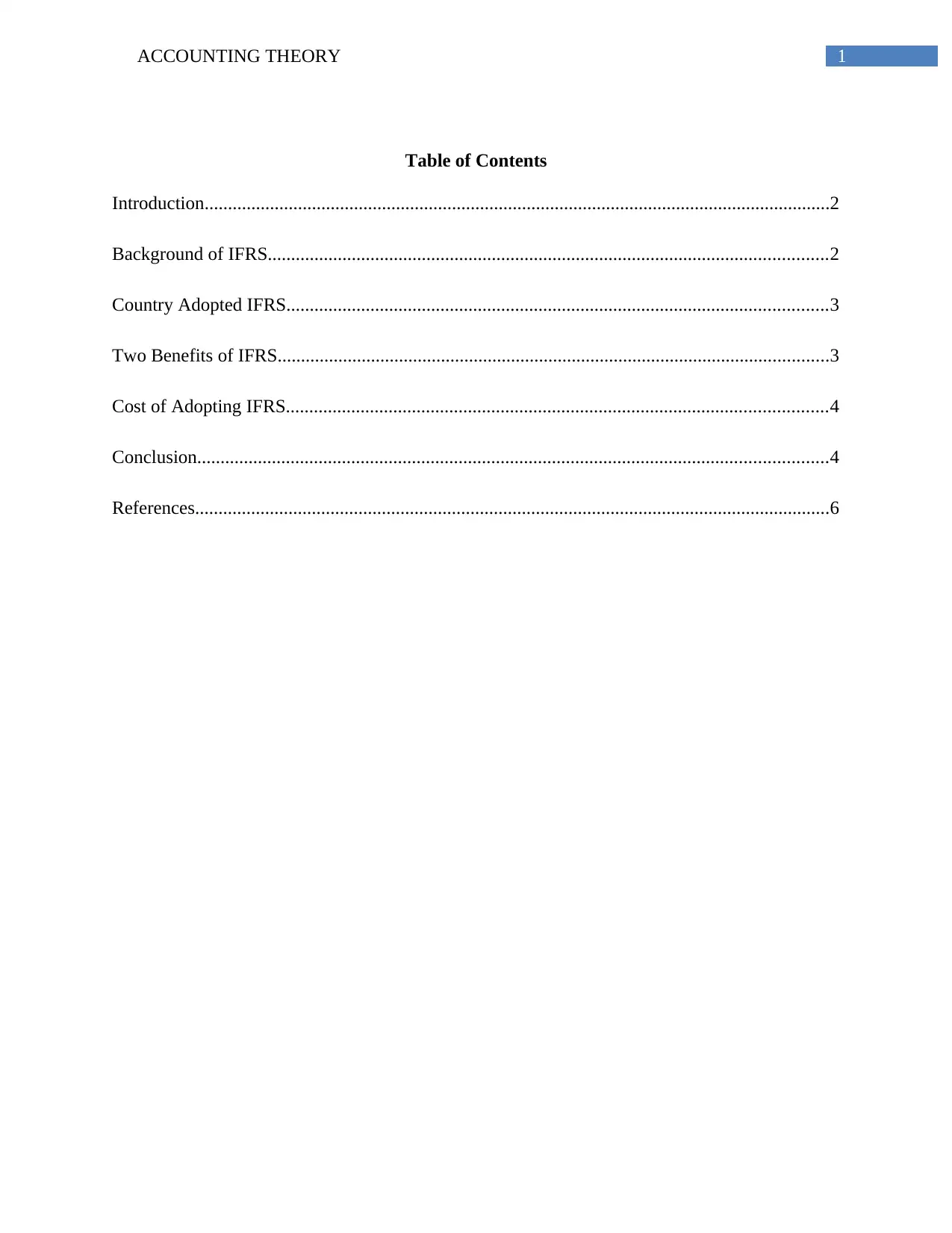
1ACCOUNTING THEORY
Table of Contents
Introduction......................................................................................................................................2
Background of IFRS........................................................................................................................2
Country Adopted IFRS....................................................................................................................3
Two Benefits of IFRS......................................................................................................................3
Cost of Adopting IFRS....................................................................................................................4
Conclusion.......................................................................................................................................4
References........................................................................................................................................6
Table of Contents
Introduction......................................................................................................................................2
Background of IFRS........................................................................................................................2
Country Adopted IFRS....................................................................................................................3
Two Benefits of IFRS......................................................................................................................3
Cost of Adopting IFRS....................................................................................................................4
Conclusion.......................................................................................................................................4
References........................................................................................................................................6
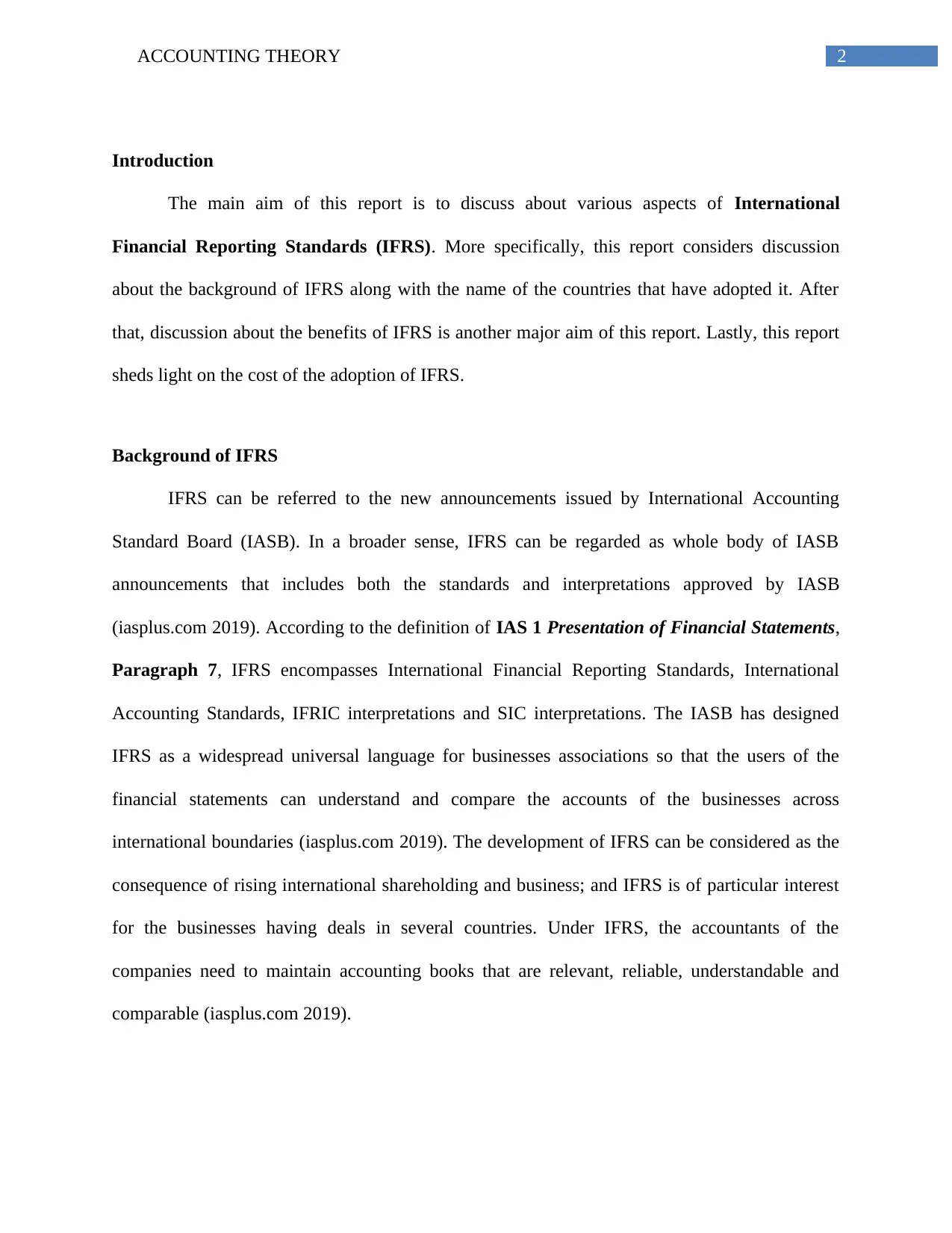
2ACCOUNTING THEORY
Introduction
The main aim of this report is to discuss about various aspects of International
Financial Reporting Standards (IFRS). More specifically, this report considers discussion
about the background of IFRS along with the name of the countries that have adopted it. After
that, discussion about the benefits of IFRS is another major aim of this report. Lastly, this report
sheds light on the cost of the adoption of IFRS.
Background of IFRS
IFRS can be referred to the new announcements issued by International Accounting
Standard Board (IASB). In a broader sense, IFRS can be regarded as whole body of IASB
announcements that includes both the standards and interpretations approved by IASB
(iasplus.com 2019). According to the definition of IAS 1 Presentation of Financial Statements,
Paragraph 7, IFRS encompasses International Financial Reporting Standards, International
Accounting Standards, IFRIC interpretations and SIC interpretations. The IASB has designed
IFRS as a widespread universal language for businesses associations so that the users of the
financial statements can understand and compare the accounts of the businesses across
international boundaries (iasplus.com 2019). The development of IFRS can be considered as the
consequence of rising international shareholding and business; and IFRS is of particular interest
for the businesses having deals in several countries. Under IFRS, the accountants of the
companies need to maintain accounting books that are relevant, reliable, understandable and
comparable (iasplus.com 2019).
Introduction
The main aim of this report is to discuss about various aspects of International
Financial Reporting Standards (IFRS). More specifically, this report considers discussion
about the background of IFRS along with the name of the countries that have adopted it. After
that, discussion about the benefits of IFRS is another major aim of this report. Lastly, this report
sheds light on the cost of the adoption of IFRS.
Background of IFRS
IFRS can be referred to the new announcements issued by International Accounting
Standard Board (IASB). In a broader sense, IFRS can be regarded as whole body of IASB
announcements that includes both the standards and interpretations approved by IASB
(iasplus.com 2019). According to the definition of IAS 1 Presentation of Financial Statements,
Paragraph 7, IFRS encompasses International Financial Reporting Standards, International
Accounting Standards, IFRIC interpretations and SIC interpretations. The IASB has designed
IFRS as a widespread universal language for businesses associations so that the users of the
financial statements can understand and compare the accounts of the businesses across
international boundaries (iasplus.com 2019). The development of IFRS can be considered as the
consequence of rising international shareholding and business; and IFRS is of particular interest
for the businesses having deals in several countries. Under IFRS, the accountants of the
companies need to maintain accounting books that are relevant, reliable, understandable and
comparable (iasplus.com 2019).
⊘ This is a preview!⊘
Do you want full access?
Subscribe today to unlock all pages.

Trusted by 1+ million students worldwide
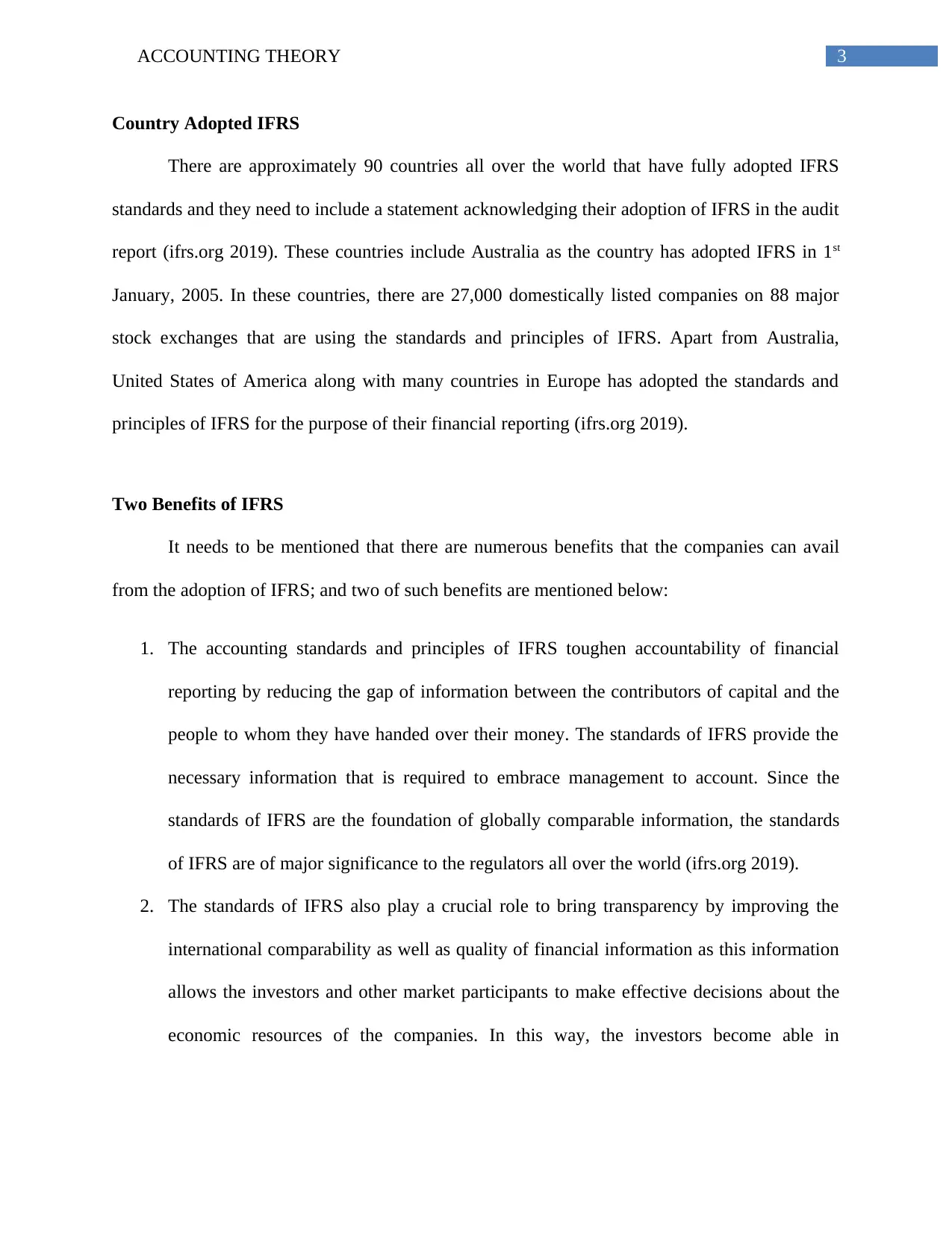
3ACCOUNTING THEORY
Country Adopted IFRS
There are approximately 90 countries all over the world that have fully adopted IFRS
standards and they need to include a statement acknowledging their adoption of IFRS in the audit
report (ifrs.org 2019). These countries include Australia as the country has adopted IFRS in 1st
January, 2005. In these countries, there are 27,000 domestically listed companies on 88 major
stock exchanges that are using the standards and principles of IFRS. Apart from Australia,
United States of America along with many countries in Europe has adopted the standards and
principles of IFRS for the purpose of their financial reporting (ifrs.org 2019).
Two Benefits of IFRS
It needs to be mentioned that there are numerous benefits that the companies can avail
from the adoption of IFRS; and two of such benefits are mentioned below:
1. The accounting standards and principles of IFRS toughen accountability of financial
reporting by reducing the gap of information between the contributors of capital and the
people to whom they have handed over their money. The standards of IFRS provide the
necessary information that is required to embrace management to account. Since the
standards of IFRS are the foundation of globally comparable information, the standards
of IFRS are of major significance to the regulators all over the world (ifrs.org 2019).
2. The standards of IFRS also play a crucial role to bring transparency by improving the
international comparability as well as quality of financial information as this information
allows the investors and other market participants to make effective decisions about the
economic resources of the companies. In this way, the investors become able in
Country Adopted IFRS
There are approximately 90 countries all over the world that have fully adopted IFRS
standards and they need to include a statement acknowledging their adoption of IFRS in the audit
report (ifrs.org 2019). These countries include Australia as the country has adopted IFRS in 1st
January, 2005. In these countries, there are 27,000 domestically listed companies on 88 major
stock exchanges that are using the standards and principles of IFRS. Apart from Australia,
United States of America along with many countries in Europe has adopted the standards and
principles of IFRS for the purpose of their financial reporting (ifrs.org 2019).
Two Benefits of IFRS
It needs to be mentioned that there are numerous benefits that the companies can avail
from the adoption of IFRS; and two of such benefits are mentioned below:
1. The accounting standards and principles of IFRS toughen accountability of financial
reporting by reducing the gap of information between the contributors of capital and the
people to whom they have handed over their money. The standards of IFRS provide the
necessary information that is required to embrace management to account. Since the
standards of IFRS are the foundation of globally comparable information, the standards
of IFRS are of major significance to the regulators all over the world (ifrs.org 2019).
2. The standards of IFRS also play a crucial role to bring transparency by improving the
international comparability as well as quality of financial information as this information
allows the investors and other market participants to make effective decisions about the
economic resources of the companies. In this way, the investors become able in
Paraphrase This Document
Need a fresh take? Get an instant paraphrase of this document with our AI Paraphraser
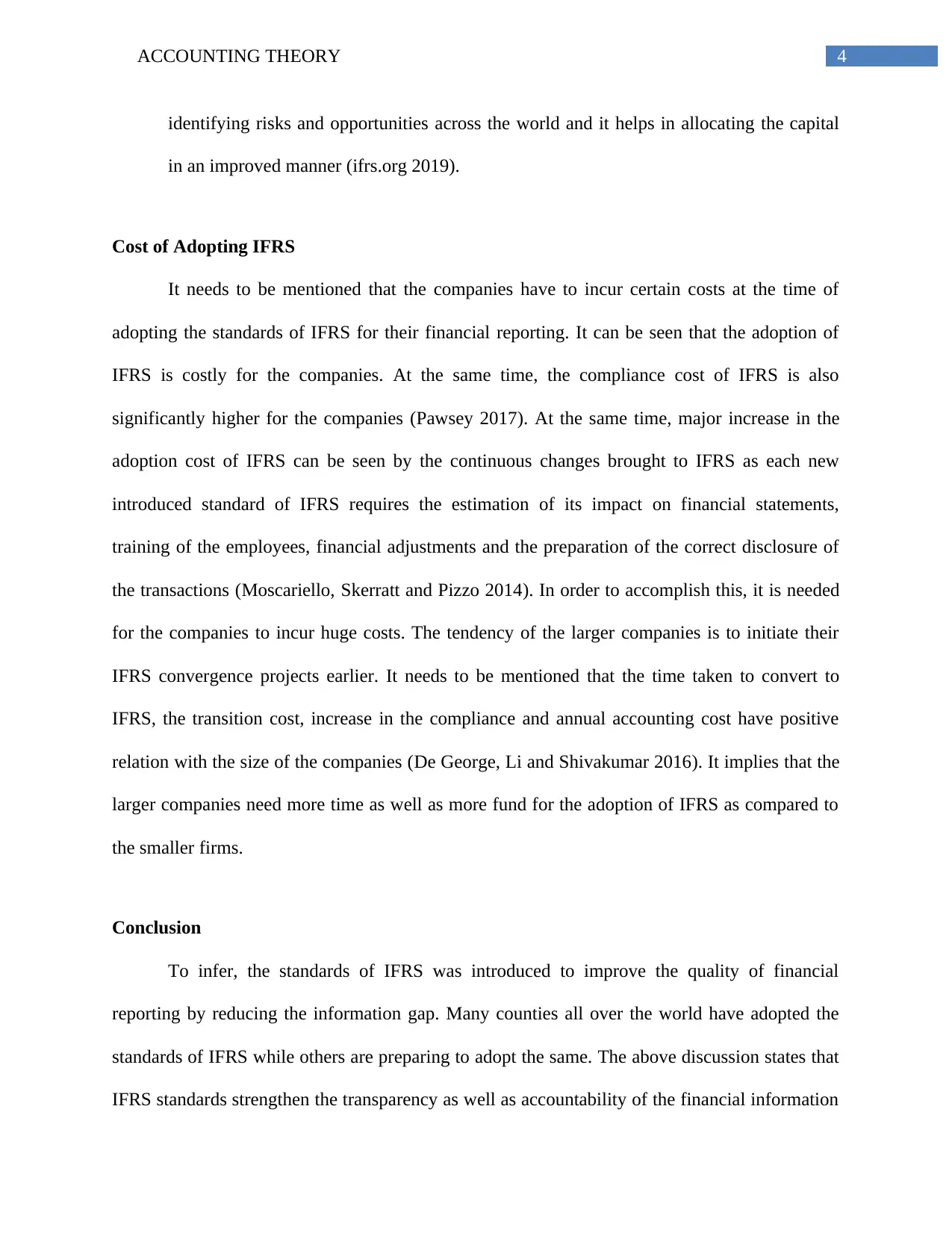
4ACCOUNTING THEORY
identifying risks and opportunities across the world and it helps in allocating the capital
in an improved manner (ifrs.org 2019).
Cost of Adopting IFRS
It needs to be mentioned that the companies have to incur certain costs at the time of
adopting the standards of IFRS for their financial reporting. It can be seen that the adoption of
IFRS is costly for the companies. At the same time, the compliance cost of IFRS is also
significantly higher for the companies (Pawsey 2017). At the same time, major increase in the
adoption cost of IFRS can be seen by the continuous changes brought to IFRS as each new
introduced standard of IFRS requires the estimation of its impact on financial statements,
training of the employees, financial adjustments and the preparation of the correct disclosure of
the transactions (Moscariello, Skerratt and Pizzo 2014). In order to accomplish this, it is needed
for the companies to incur huge costs. The tendency of the larger companies is to initiate their
IFRS convergence projects earlier. It needs to be mentioned that the time taken to convert to
IFRS, the transition cost, increase in the compliance and annual accounting cost have positive
relation with the size of the companies (De George, Li and Shivakumar 2016). It implies that the
larger companies need more time as well as more fund for the adoption of IFRS as compared to
the smaller firms.
Conclusion
To infer, the standards of IFRS was introduced to improve the quality of financial
reporting by reducing the information gap. Many counties all over the world have adopted the
standards of IFRS while others are preparing to adopt the same. The above discussion states that
IFRS standards strengthen the transparency as well as accountability of the financial information
identifying risks and opportunities across the world and it helps in allocating the capital
in an improved manner (ifrs.org 2019).
Cost of Adopting IFRS
It needs to be mentioned that the companies have to incur certain costs at the time of
adopting the standards of IFRS for their financial reporting. It can be seen that the adoption of
IFRS is costly for the companies. At the same time, the compliance cost of IFRS is also
significantly higher for the companies (Pawsey 2017). At the same time, major increase in the
adoption cost of IFRS can be seen by the continuous changes brought to IFRS as each new
introduced standard of IFRS requires the estimation of its impact on financial statements,
training of the employees, financial adjustments and the preparation of the correct disclosure of
the transactions (Moscariello, Skerratt and Pizzo 2014). In order to accomplish this, it is needed
for the companies to incur huge costs. The tendency of the larger companies is to initiate their
IFRS convergence projects earlier. It needs to be mentioned that the time taken to convert to
IFRS, the transition cost, increase in the compliance and annual accounting cost have positive
relation with the size of the companies (De George, Li and Shivakumar 2016). It implies that the
larger companies need more time as well as more fund for the adoption of IFRS as compared to
the smaller firms.
Conclusion
To infer, the standards of IFRS was introduced to improve the quality of financial
reporting by reducing the information gap. Many counties all over the world have adopted the
standards of IFRS while others are preparing to adopt the same. The above discussion states that
IFRS standards strengthen the transparency as well as accountability of the financial information
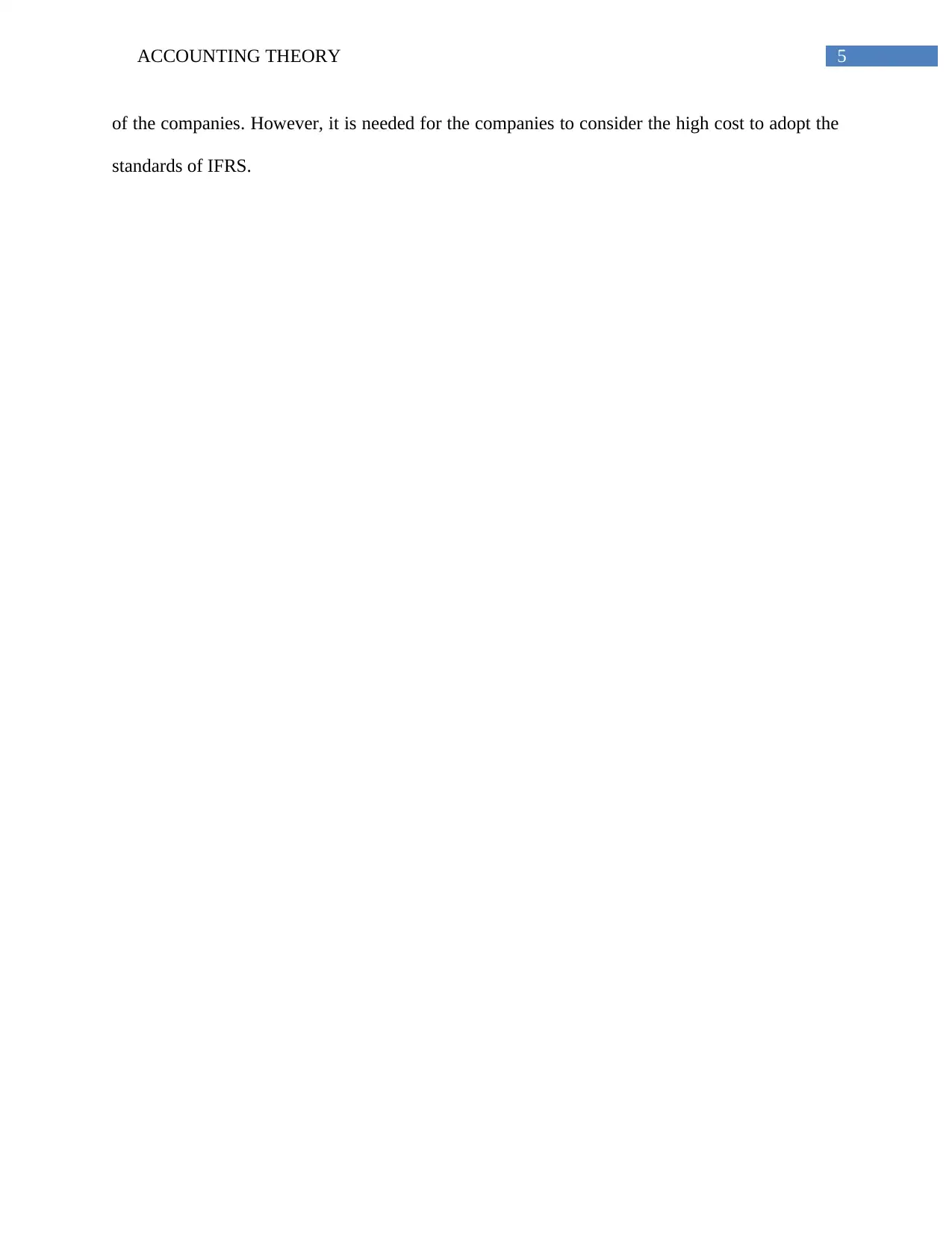
5ACCOUNTING THEORY
of the companies. However, it is needed for the companies to consider the high cost to adopt the
standards of IFRS.
of the companies. However, it is needed for the companies to consider the high cost to adopt the
standards of IFRS.
⊘ This is a preview!⊘
Do you want full access?
Subscribe today to unlock all pages.

Trusted by 1+ million students worldwide
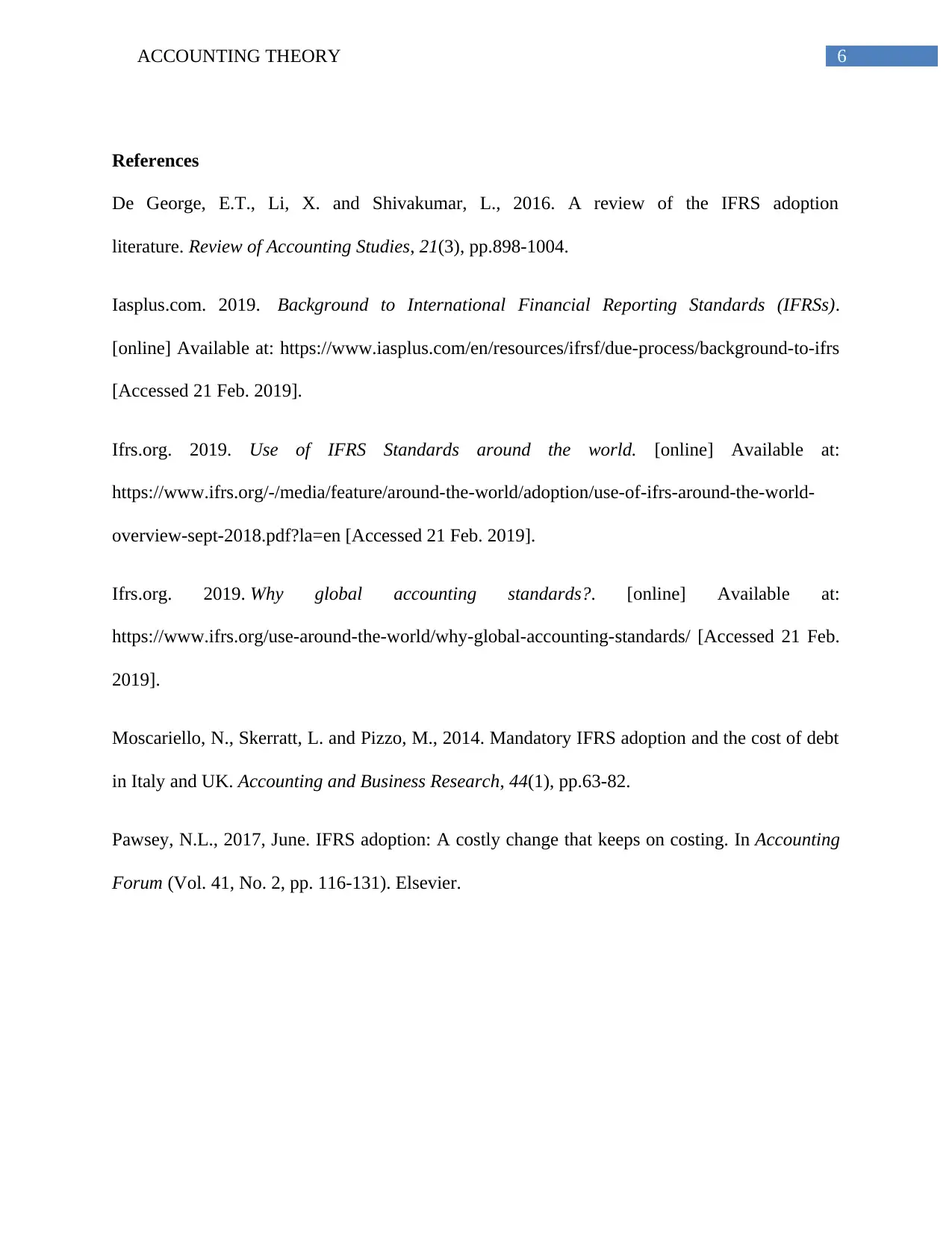
6ACCOUNTING THEORY
References
De George, E.T., Li, X. and Shivakumar, L., 2016. A review of the IFRS adoption
literature. Review of Accounting Studies, 21(3), pp.898-1004.
Iasplus.com. 2019. Background to International Financial Reporting Standards (IFRSs).
[online] Available at: https://www.iasplus.com/en/resources/ifrsf/due-process/background-to-ifrs
[Accessed 21 Feb. 2019].
Ifrs.org. 2019. Use of IFRS Standards around the world. [online] Available at:
https://www.ifrs.org/-/media/feature/around-the-world/adoption/use-of-ifrs-around-the-world-
overview-sept-2018.pdf?la=en [Accessed 21 Feb. 2019].
Ifrs.org. 2019. Why global accounting standards?. [online] Available at:
https://www.ifrs.org/use-around-the-world/why-global-accounting-standards/ [Accessed 21 Feb.
2019].
Moscariello, N., Skerratt, L. and Pizzo, M., 2014. Mandatory IFRS adoption and the cost of debt
in Italy and UK. Accounting and Business Research, 44(1), pp.63-82.
Pawsey, N.L., 2017, June. IFRS adoption: A costly change that keeps on costing. In Accounting
Forum (Vol. 41, No. 2, pp. 116-131). Elsevier.
References
De George, E.T., Li, X. and Shivakumar, L., 2016. A review of the IFRS adoption
literature. Review of Accounting Studies, 21(3), pp.898-1004.
Iasplus.com. 2019. Background to International Financial Reporting Standards (IFRSs).
[online] Available at: https://www.iasplus.com/en/resources/ifrsf/due-process/background-to-ifrs
[Accessed 21 Feb. 2019].
Ifrs.org. 2019. Use of IFRS Standards around the world. [online] Available at:
https://www.ifrs.org/-/media/feature/around-the-world/adoption/use-of-ifrs-around-the-world-
overview-sept-2018.pdf?la=en [Accessed 21 Feb. 2019].
Ifrs.org. 2019. Why global accounting standards?. [online] Available at:
https://www.ifrs.org/use-around-the-world/why-global-accounting-standards/ [Accessed 21 Feb.
2019].
Moscariello, N., Skerratt, L. and Pizzo, M., 2014. Mandatory IFRS adoption and the cost of debt
in Italy and UK. Accounting and Business Research, 44(1), pp.63-82.
Pawsey, N.L., 2017, June. IFRS adoption: A costly change that keeps on costing. In Accounting
Forum (Vol. 41, No. 2, pp. 116-131). Elsevier.
1 out of 7
Related Documents
Your All-in-One AI-Powered Toolkit for Academic Success.
+13062052269
info@desklib.com
Available 24*7 on WhatsApp / Email
![[object Object]](/_next/static/media/star-bottom.7253800d.svg)
Unlock your academic potential
Copyright © 2020–2026 A2Z Services. All Rights Reserved. Developed and managed by ZUCOL.





